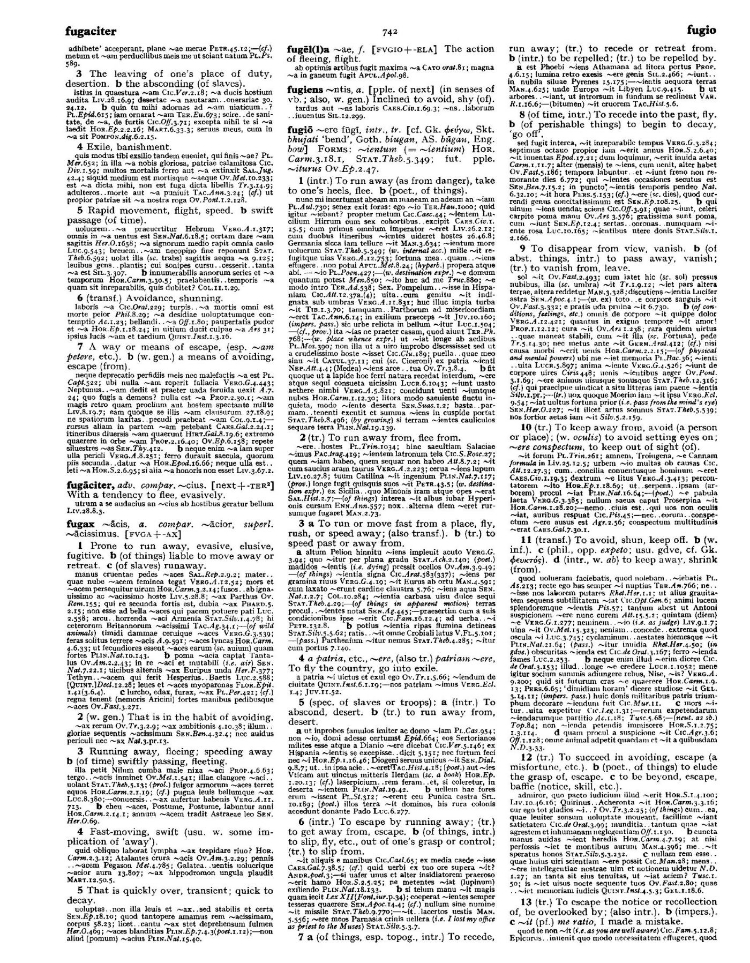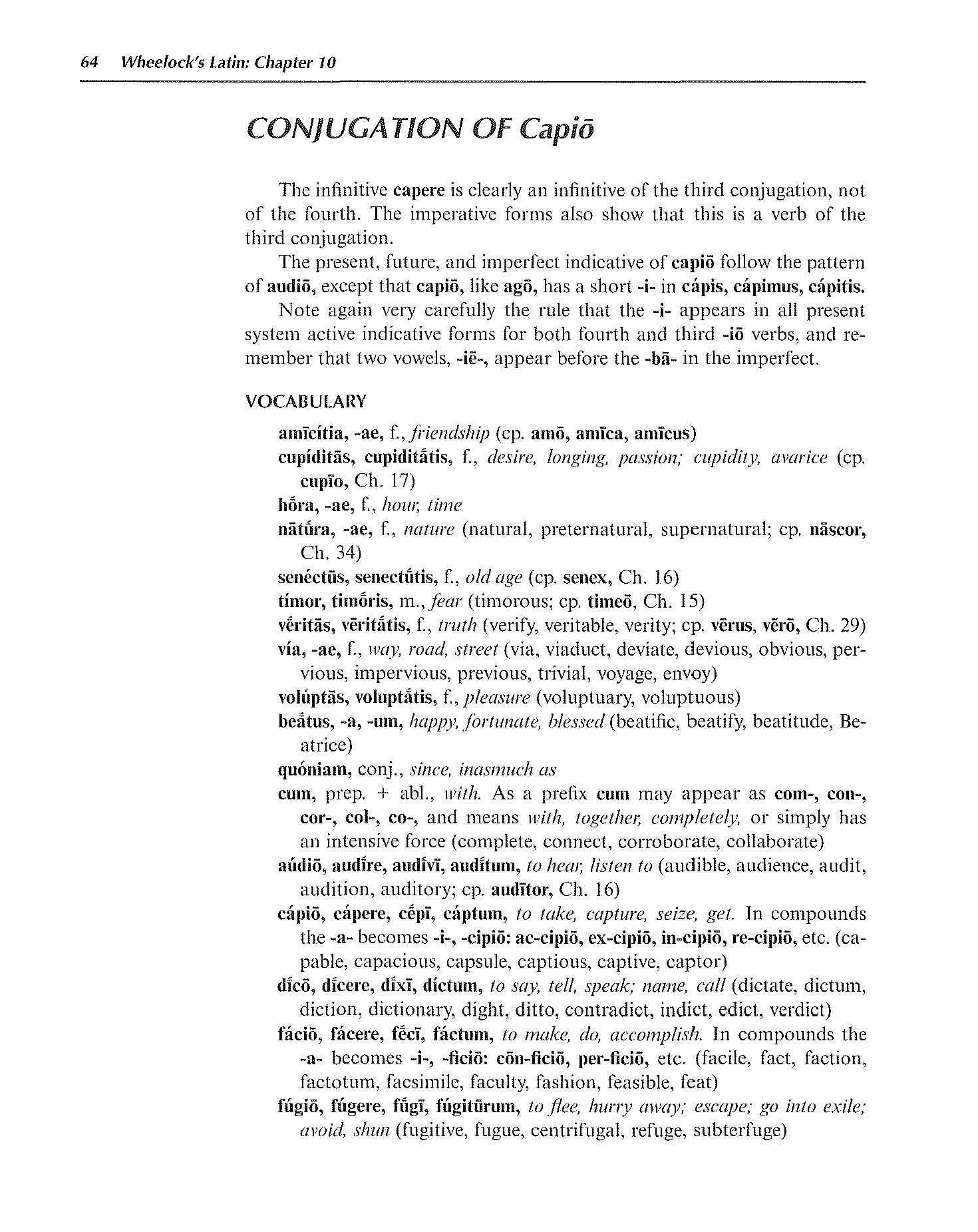
page_listing.tpl
page_subListingDetails.tpl
sub_listingDetails_style1.tpl
sub_listingDetails.title.tpl
fugere to flee
fugere is a Latin Verb that primarily means to flee.
Definitions for fugere
Wheelock's Latin
Verb
- 1
to flee, hurry away, escape, go into exile, avoid, shun
English derivatives:
fugitive fugue centrifugal refuge subterfuge
Oxford Latin Dictionary
Verb
- 1
(intr.) To run away (as from danger), take to one's heels, flee. (b) (poet., of things).
- 2
(tr.) To run away from, flee from.
- 3
(a) To run or move fast from a place, fly, rush, or speed away; (also transf.). (b) (tr.) to speed past or away from.
- 4
a patria, etc., ~ere, (also tr.) patriam ~ere, To fly the country, go into exile.
- 5
(spec. of slaves or troops): (a) (intr.) To abscond, desert. (b) (tr.) to run away from, desert.
Sentences with fugere
Latin to English
Ducī nūntiāvimus cēterōs mīlitēs in illam terram fugere (fūgisse).Compare We announced to the leader that the other soldiers were fleeing (had fled) into that land.
Quīnque ex custōdiīs interfectīs, pater meus cum duōbus ex fīliīs et cum magnō numerō amīcōrum in illam terram līberam fūgit.Compare When five of the guards had been killed, my father fled into that free land with two of his sons and with a large number of friends.
Ultra Sauromatas fugere hinc libet et glacialem Oceanum, quotiens aliquid de moribus audent qui Curios simulant et Bacchanalia vivunt.Compare Whenever those who pose as Curii and live one long bachanal venture a comment on morals, I long to flee to the Sarmatians and the Frozen Sea.
Fugio, suus magis conscientia quam indicium homo nullus res conscius metuens.Compare He fled, fearing his own conscience rather than the information of men who were privy to nothing.
Conjugation table for fugere
Cactus2000
| ACTIVE | |
| Indicative present | Indicative imperfect |
| fugiō fugis fugit fugimus fugitis fugiunt | fugiēbam fugiēbās fugiēbat fugiēbāmus fugiēbātis fugiēbant |
| Indicative perfect | Indicative pluperfect |
| fūgī fūgistī fūgit fūgimus fūgistis fūgērunt / fūgēre | fūgeram fūgerās fūgerat fūgerāmus fūgerātis fūgerant |
| Indicative future | Indicative future perfect |
| fugiam fugiēs fugiet fugiēmus fugiētis fugient | fūgerō fūgeris fūgerit fūgerimus fūgeritis fūgerint |
| Subjunctive present | Subjunctive imperfect |
| fugiam fugiās fugiat fugiāmus fugiātis fugiant | fugerem fugerēs fugeret fugerēmus fugerētis fugerent |
| Subjunctive perfect | Subjunctive pluperfect |
| fūgerim fūgeris fūgerit fūgerimus fūgeritis fūgerint | fūgissem fūgissēs fūgisset fūgissēmus fūgissētis fūgissent |
Infinitive present fugere Infinitive perfect fūgisse Infinitive future fugitūrum esse | Imperative present fuge fugite Imperative future fugitō fugitō fugitōte fugiuntō |
| Indicative present | Indicative imperfect |
| - - fugitur - - - | - - fugiēbātur - - - |
| Indicative perfect | Indicative pluperfect |
| - - - - - - | - - - - - - |
| Indicative future | Indicative future perfect |
| - - fugiētur - - - | - - - - - - |
| Subjunctive present | Subjunctive imperfect |
| - - fugiātur - - - | - - fugerētur - - - |
| Subjunctive perfect | Subjunctive pluperfect |
| - - - - - - | - - - - - - |
Infinitive present fugī Infinitive perfect - Infinitive future - | Imperative present - - Imperative future - fugitō - - |
| PARTICIPLE | ||
| Participle present active | ||
| Nom. | fugiēns | fugientēs |
| Gen. | fugientis | fugientium |
| Dat. | fugientī | fugientibus |
| Acc. | fugientem | fugientēs |
| Abl. | fugiente | fugientibus |
| Participle future active | ||
| Nom. | fugitūrus | fugitūrī |
| Gen. | fugitūrī | fugitūrōrum |
| Dat. | fugitūrō | fugitūrīs |
| Acc. | fugitūrum | fugitūrōs |
| Abl. | fugitūrō | fugitūrīs |
| Participle perfect passive | ||
| Nom. | - | - |
| Gen. | - | - |
| Dat. | - | - |
| Acc. | - | - |
| Abl. | - | - |
| Gerundive | ||
| Nom. | fugiendus | fugiendī |
| Gen. | fugiendī | fugiendōrum |
| Dat. | fugiendō | fugiendīs |
| Acc. | fugiendum | fugiendōs |
| Abl. | fugiendō | fugiendīs |
| Gerund | Supine | |
| Nom. | fugere | - |
| Gen. | fugiendī | - |
| Dat. | fugiendō | |
| Acc. | fugiendum | |
| Abl. | fugiendō | |
Data sources
Notes
- Definitions
- Frederick M. Wheelock, Wheelock's Latin, 6th ed., rev. Richard A. LaFleur (New York, NY: HarperCollins Publishers, 2005): 64.
- P. G. W. Glare, Oxford Latin Dictionary, Vols. 1-8 (Oxford: Clarendon Press, 1982): 742.
- Word frequencies
- Christopher Francese, "Latin Core Vocabulary," Dickinson College Commentaries, last modified 2014, http://dcc.dickinson.edu.
- Paul B. Diederich, The Frequency of Latin Words and Their Endings, PhD diss., (Columbia University, 1939).
- Louis Delatte, Suzanne Govaerts, Joseph Denooz, and Etienne Evrard, Dictionnaire fréquentiel et index inverse de la langue latine [Frequency Dictionary and Inverse Index of the Latin Language] (Liège, Belgium: Laboratoire d'analyse statistique des langues anciennes de l'Université de Liège [L.A.S.L.A.], 1981): 120.
Bibliography
Allen, Joseph H. Allen and Greenough's New Latin Grammar for Schools and Colleges: Founded on Comparative Grammar. Edited by James B. Greenough, George L. Kittredge, Albert A. Howard, and Benjamin L. D'Ooge. Boston, MA: Ginn & Company, 1903.
Crystal, David. A Dictionary of Linguistics and Phonetics. 6th ed. Oxford, UK: Blackwell Publishing, 2008.
Delatte, Louis, Suzanne Govaerts, Joseph Denooz, and Etienne Evrard. Dictionnaire fréquentiel et index inverse de la langue latine [Frequency Dictionary and Inverse Index of the Latin Language]. Liège, Belgium: Laboratoire d'analyse statistique des langues anciennes de l'Université de Liège (L.A.S.L.A.), 1981.
Diederich, Paul B. The Frequency of Latin Words and Their Endings. PhD diss., Columbia University, 1939.
Francese, Christopher. "Latin Core Vocabulary." Dickinson College Commentaries. Last modified 2014. http://dcc.dickinson.edu/latin-vocabulary-list.
Gildersleeve, Basil L., and Gonzales Lodge. Gildersleeve's Latin Grammar: Third Edition, Revised, and Enlarged. 3rd ed. London, England: Macmillan and Co., 1903.
Glare, Peter G.W. Oxford Latin Dictionary. Vols. 1-8. Oxford, England: Clarendon Press, 1982.
Krüger, Bernd. "Latin Conjugation Tables." Cactus2000. Accessed May 5, 2023. https://latin.cactus2000.de/index.en.php.
Pierson, Nick. "Sound of Text." Accessed October 26, 2019. https://soundoftext.com.
Wheelock, Frederick M. Wheelock's Latin. 6th ed. Revised by Richard A. LaFleur. New York, NY: HarperCollins Publishers, 2005.
Wiktionary Contributors. "Victionarium." Wikimedia Foundation, Inc. Updated March 18, 2019. https://la.wiktionary.org/wiki/Victionarium:Pagina_prima.
Citation
Chicago (17th ed.)
Allo Contributors. "fugiō, fugere, fūgī, fugitūrum (v.) - Latin Word Definition." Allo Latin Dictionary. Last modified . Accessed February 20, 2026. http://ancientlanguages.org/latin/dictionary/fugio-fugere-fugi-fugiturum.
Entry created on . Last updated on .







